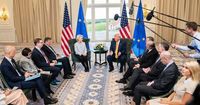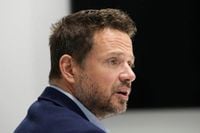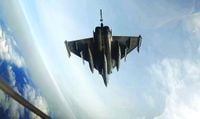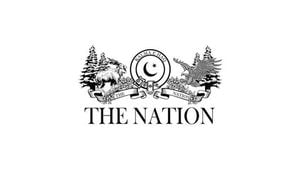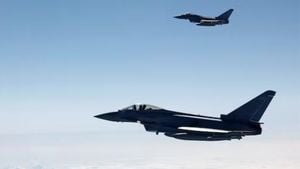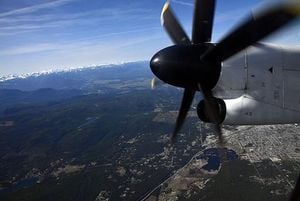As Poland stands at a crossroads, the country’s presidential election on September 21, 2025, is unfolding against a backdrop of regional instability, war in neighboring Ukraine, and renewed questions about the reliability of its Western allies. The stakes are high: not only is Poland’s own security on the line, but so too is the cohesion of NATO’s eastern flank and the nature of transatlantic ties that have defined European security since the end of World War II.
The anxiety in Warsaw and across Europe was palpable this week after a dramatic incursion of nearly 20 drones from Russia crossed into Polish airspace on September 10. According to Reuters, this marked the first time since the start of the war in Ukraine that NATO members fired on a Russian target violating alliance airspace. Polish forces, backed by aircraft from other NATO members, shot down several of the 19 drones, in what many saw as a clear test of both NATO’s military capabilities and the resolve of its most powerful member, the United States.
Yet, it was not just the drones that rattled nerves. The response from US President Donald Trump—or, more accurately, the lack thereof—sparked unease among European diplomats and officials. Trump’s muted public reaction, which some described as a "public shrug," contrasted sharply with the swift crisis management and solidarity displayed by previous US administrations. On his Truth Social platform, Trump cryptically posted, "What’s with Russia violating Poland’s airspace with drones? Here we go!" When pressed by reporters a day later, he suggested, "It could have been a mistake."
Poland’s Prime Minister Donald Tusk was quick to reject the idea that the drone incursion was accidental. As reported by Reuters, Tusk flatly dismissed the notion, signaling a rare public contradiction of a US president from one of Washington’s closest European allies. The incident, and Trump’s response, have only fueled existing doubts among NATO members about the US commitment to their defense in the event of a direct Russian attack.
Behind the scenes, the White House offered little reassurance. A senior official, speaking on condition of anonymity, said the president "wants this war, which was brought on by Joe Biden’s incompetence, to end as quickly as possible" and emphasized that it is up to Russia and Ukraine to halt the conflict, with Europe expected to "do its part by putting economic pressure on countries that finance the war." The US did join a joint statement with Western allies expressing concern about the incursion and accusing Moscow of violating international law, but the initial response left many in Europe feeling exposed.
The contrast with past US actions was stark. When a stray missile struck a Polish village in November 2022, then-President Joe Biden swiftly convened an emergency meeting of world leaders. This time, Trump’s language was notably milder than the condemnation voiced by several European leaders and even his own ambassador to NATO, Matthew Whitaker, who pledged the defense of "every inch of NATO territory." Trump did speak with Polish President Karol Nawrocki, reaffirming solidarity, but there was no mention of new weapons or equipment in the aftermath of the call.
NATO Secretary-General Mark Rutte did his best to project unity, announcing plans on September 12 to strengthen the alliance’s eastern flank and asserting that Trump had made "absolutely clear that we all stand together on this." Nonetheless, multiple diplomatic sources told Reuters that the prevailing mood in Europe ranged from confusion to outright dismay. "No-one in NATO has been particularly reassured by the US at this point. Washington’s silence has been almost deafening," said an Eastern European diplomat.
For Poland, which borders Russia’s Kaliningrad exclave, Belarus, and war-torn Ukraine, the timing could hardly be more critical. The nation is not just a neighbor to conflict zones—it is a logistics hub for military aid to Ukraine and a frontline state in NATO’s defense posture. As The Independent notes, fears are rising that if Russia prevails in Ukraine, it could target other former Soviet bloc countries.
Against this tense security backdrop, Poles are preparing to head to the polls to choose a successor to President Andrzej Duda, whose second term concludes in August. The field is crowded, with 13 candidates vying for the presidency, making a first-round victory unlikely and a June 1 runoff all but certain. The leading contenders are Warsaw’s liberal mayor, Rafał Trzaskowski, and conservative historian Karol Nawrocki, backed by the Law and Justice party.
The outcome could reshape Poland’s foreign policy and its relationship with both the US and the European Union. Both Trzaskowski and Nawrocki support continued US military engagement in Europe, but their visions for Poland diverge sharply on the role of the EU and domestic policy. Trzaskowski, a cosmopolitan modernizer, is running on a pro-European platform, pledging to defend judicial independence and rebuild democratic institutions. Nawrocki, meanwhile, is more skeptical of Brussels, promotes a nationalist agenda, and has drawn praise from conservatives for patriotic education and dismantling Soviet monuments—but he also faces criticism for inexperience and divisive rhetoric.
The presidency is no mere figurehead in Poland. As commander-in-chief, the president wields significant influence over military and foreign policy, holds veto power, and shapes national discourse. Under Duda, the office advanced the conservative agenda of Law and Justice, often blocking reforms aimed at restoring judicial independence and repairing relations with the EU—moves that have left the country’s centrist coalition government, led by Prime Minister Donald Tusk since late 2023, frustrated and gridlocked.
"The stakes are enormous for the ruling coalition and for those concerned with the future of Polish democracy," Jacek Kucharczyk, president of the Institute of Public Affairs, told The Independent. "This is about democratic reform and restoring the rule of law—and that can only happen with cooperation from the next president." The election is also pivotal for Law and Justice, as its future as a dominant political force could hinge on the outcome.
The recent drone incident has served as a wake-up call for Europe, exposing gaps in defense readiness and highlighting the need for greater investment in capabilities against new threats. "The drone attack showed that we are not ready for defense against drones," a senior German official told Reuters. "We have to develop capabilities as soon as possible." Former NATO secretary-general Anders Fogh Rasmussen echoed this sentiment, noting that Europe must now step up by deploying real assets, investing in Ukraine’s defense industry, and providing concrete security guarantees—while also insisting that "the United States must remain engaged."
Meanwhile, Poland has activated Article 4 of NATO’s treaty, requesting consultations with allies over threats to its territorial integrity—a move that underscores the seriousness with which Warsaw views the current situation. Notably, US warplanes did not participate in shooting down the drones, as the Dutch military was responsible for Polish airspace at the time under NATO’s air policing mission, a fact that some European diplomats found worrisome.
As the election approaches, the choices made by Polish voters will reverberate far beyond Warsaw. With the US commitment to European security in question and the specter of Russian aggression looming, the outcome will help determine not just the future of Polish democracy, but the security architecture of Europe itself.
